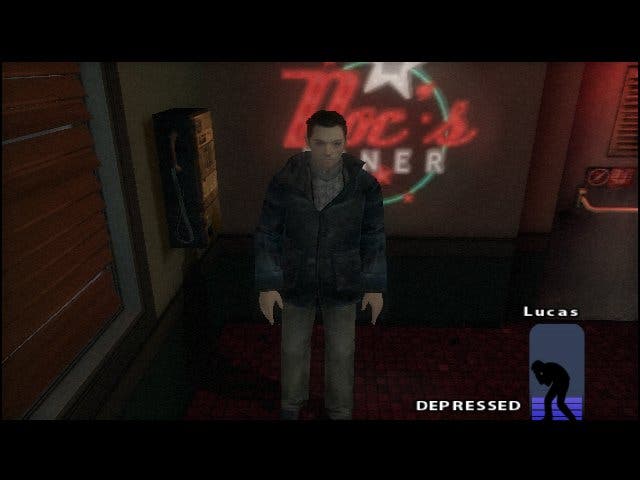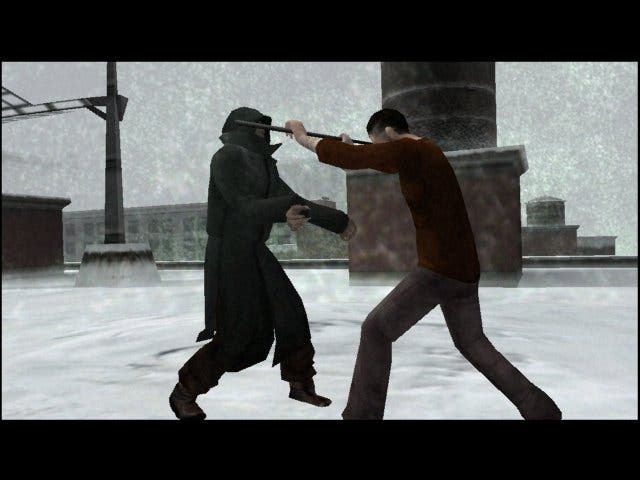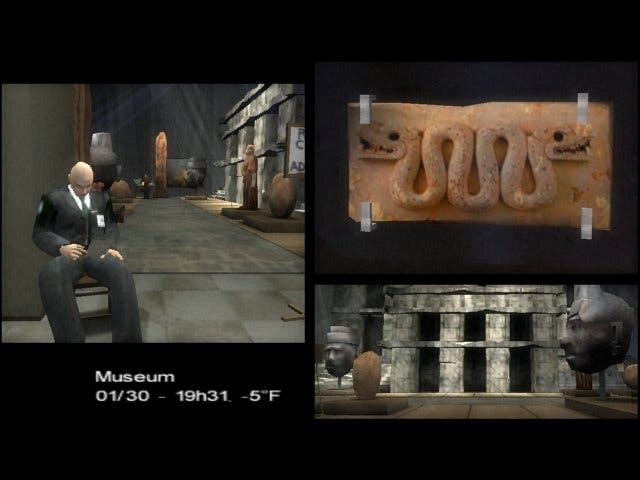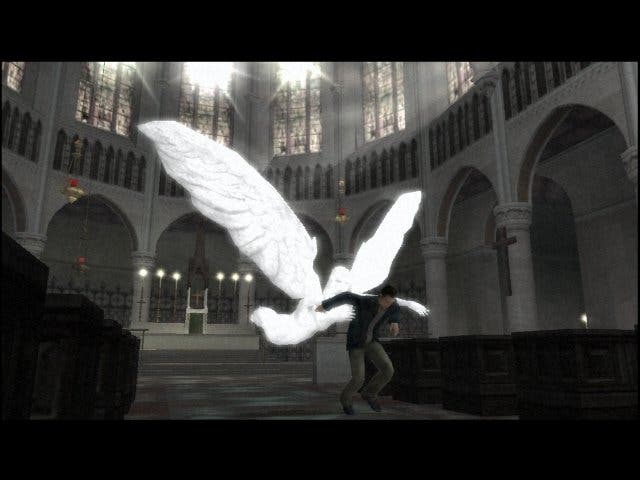Fahrenheit
Typically, Tom reaches a slightly different conclusion.
14th August 2005, 23:12. Unknown place.
I'd been sitting at the PC for hours trying to review Fahrenheit. It was getting late; my health was deteriorating, and the pressure to write something that slotted neatly on the end of Kristan's conclusion was immense. Was this the saviour of the adventure game genre? Were its action sequences the awkward inclusions he'd told me they were? I wasn't sure. Fahrenheit may have been flawed, but it worked for the most part - and it felt like the process of getting to the bottom of that would involve contradicting the man who held sway over my words many times over.
Then it hit me. And I let the scene play out.
GET READY!
[LEFT] BEEP! [LEFT] BEEP! [RIGHT] BZZT! [UP] BZZT!
FAILED.
"Why on earth would you want to chop all the interaction out of Fahrenheit's action sequences?
- Dodge question (UP) - Lie (DOWN) -
[UP]
"That's not the real issue here. The real issue is the story - it's a clever murder mystery about a bloke who kills someone but thinks he was possessed. It's very well written, with subtlety and emotional balance, beautifully told with suspenseful use of split-screen and other directorial devices, and there are only a couple of scenes that might have been cut (usually involving bits where you have to get the detectives to draw their conclusions when you've already figured them out). Progressing through the story is itself a challenge - based on a mixture of maintaining your mental strength by looking after your character's emotional needs (making sure they're drinking water, listening to music, bathing and so on during quiet moments), and handling delicate social situations logically - and that deserves real credit. The action sequences are superfluous and the frustration they build up is unforgivable."
-30... Wrecked.

And that's where our review ends. The answer to the question misdirected the reader and did a disservice to certain fine elements of the game. We'd never know how good Fahrenheit truly was.
[CONTINUE FROM LAST SAVE POINT]
GET READY!
[LEFT] BEEP! [LEFT] BEEP! [LEFT] BZZT! [UP] BZZT!
FAILED.
"Why on earth would you want to chop all the interaction out of Fahrenheit's action sequences?
- Dodge question (UP) - Lie (DOWN) -
[DOWN]
"Action has no place in the adventure genre. By tethering these sequences to an otherwise marvellous adventure you're merely cutting off a large number of gamers and your overall audience decreases. Some people still value thought and Fahrenheit demands it enough without having to pander to the masses with its tap-tap-tap-tap nonsense. It's mass-market pretension. Reaction-based gaming is for the thoughtless."
-30... Wrecked.
And that's where our review ends. The answer to the question gave way to anger and the reader decided to give up on what was destabilising into a rant. We'd never know how good Fahrenheit truly was.
[CONTINUE FROM LAST SAVE POINT]
GET READY!
[LEFT] BEEP! [LEFT] BEEP! [DOWN] BEEP! [DOWN] BEEP!
GREAT!
"Why on earth would you want to chop all the interaction out of Fahrenheit's action sequences?
- Dodge question (UP) - Lie (DOWN) - Truth (LEFT) -
[LEFT]
"Sigh. I love adventure games. I miss being able to take my time, and use my brain alone to make progress. My reactions aren't what they used to be. The truth is that Fahrenheit should be praised for daring to mix action elements into such a fundamentally story-based game because the result, while subtle, is significant.

"Maintaining mental strength and choosing the right thing to say are part of it, but the very action mechanics I'm decrying make a big difference to non-action sequences too; by hitting buttons in sequence during certain breaks in conversation, you can read the other person's thoughts. It's not a gimmick; it's woven into the fabric of the story, and it contributes to mental strength and your ability to pick the best-possible response.
"What's more, the Pavlovian reaction to the 'Get Ready!' prompt and the agony of trying to hammer the analogue triggers alternately is one reason the player feels involved, despite the direct control of three main characters and several secondary characters. Without this overlay of involvement, you're just directing them to and through conversations and then watching the fireworks from a distance. By having to guide their investigation, their conversation, and their movements in action sequences, a stronger bond emerges than would otherwise. When that mental strength level sinks, so does your heart. When those 'Get Ready!' prompts appear, you feel slightly nervous, and then you toil with your thumbs and index fingers. In this way, you share their exertion as well as their emotion. Fahrenheit is better as an action-adventure than a pure adventure. I can see that now."
+10... Tense.
Right. The above illustrates several things:
1) The way that conversations often work in Fahrenheit.
2) That Fahrenheit mixes elements of adventure games (investigation, threaded conversations, the very-occasional actual puzzle) with action games (hand-to-hand combat, climbing obstacles, evading enemies by judging movement patterns) and uses a central system of reactionary button-presses and alternate hammering of shoulder buttons to help thread them together - and ultimately tells a story that you feel involved in as well as wanting to unravel.

As you make your way through an ever-chilling New York, flitting in and out of the killer and the cops' worlds, soaking up the ambience of the superb soundtrack and becoming more involved in David Cage's intriguing mystery - a tale of possession, loss, betrayal and far more themes than are apparent during the opening couple of hours' play - the sense that the unusual combination of control elements is awkward or ill-considered gives way to the realisation that it's borderline-harmonic - even if that realisation only manifests itself subconsciously in the sense that you can't put down the pad. That some action sequences are hard is a question of balance, not one of their legitimacy.
3) Choice is often illusionary, and although certain elements do have an impact on the way it all pans out (indeed, there are some incredibly different outcomes to certain situations), many selections lead to the same end, and your choices often have a greater bearing on the distance to the Game Over screen than they have on the things you'll do and see later on.
At one point midway through, yours truly had to stop and replay a large chunk of the game because I hadn't heeded the tutorial's advice and taken every opportunity to tend to my characters' mental strength. Having failed to take advantage of the various comforts of Lucas's apartment during a quiet moment, a few scenes later he was doomed to become suicidal and deranged whatever path I chose. Play Fahrenheit without tending to your characters' needs and they will crack up and cost you a lot of time. However, conversely, learning the hard way to try and pick the best path through each scene can give you far more satisfying outcomes; for Lucas, my rejoining the game at the stage where his ex-girlfriend comes over to collect some boxes, and playing it out differently, certainly proved more satisfying. In other words, being able to avoid huge frustration with fair warning is okay. But the fact that it's there to be stumbled upon makes a difference to the mark at the bottom.
It's also worth reflecting on the question of 'morals'. You don't make moral choices in Fahrenheit; you make practical decisions. There are moral choices made by the main characters, but giving you control of them would be like adding a Russian Roulette sub-game. To give an example, at one point Lucas is nearly captured, but decides that not only does he want to clear his name but that he must do so for the greater good. So he legs it. The moral choice there is to give up; you killed someone, after all. If the player chose to, the story would end. What's the point in that? No, Fahrenheit doesn't give you moral control, but it does give you an influential role.
4) Those of us who read a question with a hint of conspiracy about it and work ourselves up into a frenzy trying to reach the answer will probably love it. The outcome (particularly the last hour or so) may seem a bit confusing, but the journey is worth it - and those of you with a love of unusual gaming designs will thrive upon it too. This reviewer blitzed more or less the entire game in one sitting (one increasingly hungry, thirsty and uncomfortable sitting at that) mostly out of desire rather than necessity. But if you come to it with the wrong expectation you may leave it unhappy. Hammering those analogue triggers is structurally significant to the game, but may be horribly painful for you if your hand-eye coordination is under-developed or worn down (or because you have arthritis from sticking up for crap adventure games on web-forums for the past decade or so). Heck, my index fingers were often worn out at the end of an action sequence, and they have phalanges that could pass SAS selection.

Whatever those four points make you think about the game though, you should also be aware that the camera-sensitive movement controls are a universal problem that will frustrate you. They may not ruin it, but they will probably lead you to fail or curse them at least once or twice.
What's more, at least one of the two playable cops feels more like a storytelling device than a critical element of the tale. That's not to say I didn't enjoy the game for their involvement (and they're both likable characters), but it's also fair to say that they aren't always that important to what's actually happening; the balance of contributions to the Big Answer is weighted heavily toward Lucas.
Ultimately, if you're a gamer - whether brought up on adventures, action games, or whatever - with a love of the mysterious and fantastical, you owe it to yourself to take a look at Fahrenheit. Ease your way past initial frustrations and let the storytelling get its hooks into you and you'll probably follow it to conclusion. Sadly, despite the fact there's more than one possible end sequence, you don't have total control over the outcome, but then how could the game give you that? Like any such game, your choices and actions determine the success or failure of the main characters in each individual section. The difference is that the manner in which you control your characters is far more involving on various levels. Saying the right thing is Fahrenheit's version of buying the right sword. It may sound slightly detached when considered in traditional action-adventure terms, but Quantic Dream's thought harder about you than them, and for that alone Fahrenheit is worth seeing.




